- From Faith Current: “The Sacred Ordinary: St. Peter’s Church Hall” - May 1, 2023
- A brief (?) hiatus - April 22, 2023
- Something Happened - March 6, 2023
Ran across this yesterday for the millionth time and wanted to share; George was an interesting dude. A month later, he was diagnosed with throat cancer—making this George Harrison’s last interview.
George’s core struggle is right here. He spoke the wisdom, saw and felt that it was true, but (for example) smoked so much he died at 58. I suppose there are some few holy men and women who can handle it, but for the rest of us, addiction is the opposite of enlightenment.
George, like John, was right here in the soup with us, his flaws and virtues all mixed together. As I get older, I don’t admire my heroes for always being right or acting wisely; I admire them for wanting wisdom, telling the rest of us about it, and doing their best. That’s all anybody can do.

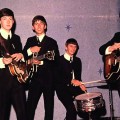
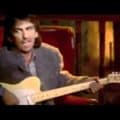
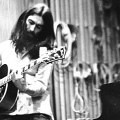
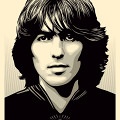

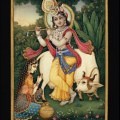

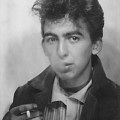

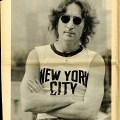
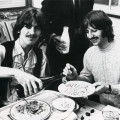

I remember Dick Cavett years ago sharing his recollections of his George Harrison interview. Cavett said his producers and friends advised against having Harrison as a guest, as he was “not very interesting.”
To this day, I cannot imagine what they were thinking to give advice like that.
As it turns out, George was funny and charming and smart on the Cavitt show… everything you’d want for an interview and more.
I can listen to Harrison speak for hours. I can almost feel my brain rearranging itself when I hear one of his extended interviews. He always elevates the interviewer, as well.
George reminds us that even as talented and famous as he was, he was human. Even Beatles are not immune from heartache, addiction, cancer, and death.
I remember Paul saying in an interview that George encouraged him to let go of his anger towards Yoko.
That it wasn’t healthy, and no way to live. Paul eventually did, and I’m sure George’s words are part of the reason why.
I’m so glad Paul and George made their peace and got to say goodbye. No matter the squabbles and lawsuits, the four Beatles were brothers.
I have read that it was very important for George that he be in the right frame of mind for his own death. Since that is what he wanted, I am very glad that his death came in such a way that he could prepare for it (unlike, say, John). George was apparently particularly angry about that.
.
But of course George knew that John’s death was the ripening of John’s karma, and MDC’s, and everybody’s. Karma’s an impossibly difficult and complex process — it’s not “bad things happen to those who do bad things” — but the point is, nothing is outside “causes and conditions.” Everything is dependent on everything else. And things that we, in our limited knowledge, believe to be tragedies, might not be tragic; they might be the best of all possible outcomes. It’s literally impossible to know. Our brains busily try to figure it out, and apply our preferences, and decide, “That was terrible!” or “That was terrific!” When all we can really say for sure is, “that sure was” and move forward applying our best efforts.
.
Of course, I’m speaking from the spiritual tradition I know a tiny bit about (Buddhism) rather than George’s own (Hare Krishna). I have no knowledge of that faith; but I will say that the restrictive aspects of it–no sex, no drugs, no no no–seemed to give George a lot of trouble, and seems to have been at the core of his resentment of Beatledom — in that he faced much more temptation than most people. Well, that’s true, but that’s also your karma, George! Indulge, abstain, are you SURE what’s holy? Swami Bill over there isn’t a Beatle, celibacy isn’t such a trial for him; it FITS Swami Bill, and maybe your suffering means it doesn’t FIT you. I dunno George, but you’re all right by me, fella.
.
It has always interested me that George picked a very intense and demanding form of religion; like his friend John and diets. Those guys — it wasn’t enough for George to meditate, he had to become a holy man. It wasn’t enough for John to go on a diet, he picked macrobiotics. Tough to go from full-on steak-and-orgies Beatledom to those things. In general those demanding paths are picked by people in real pain, desperate people. When George says, “I don’t feel like I’m on the right planet,” that’s a level of desperation that I wish he could have addressed pre-guru. Because he wasn’t on the wrong planet; what was happening, what was he feeling, who were his friends that he felt that alienated?
.
Anyway I am sure that part of George’s “preparing for death” was making peace with Paul.
Good point Michael, about George and John choosing demanding practices. It does seem that they were the ones to immerse themselves completely in something, whereas Paul and Ringo were more balanced.
I do think that fame was not a positive thing for George. Olivia Harrison has said she felt George suffered from PTSD due to his Beatles experience, and that he wasn’t emotionally equipped to handle it.
That makes sense when you think about how he spent the majority of his time in his later years at Friar Park, isolating himself. His gardening seems to have been a soothing practice for him.
I think some people, like George, are HSP’s. (Highly Sensitive People) They are deeply affected by the people and situations around them. Very emotional and intuitive.
George clearly didn’t suffer the childhood traumas like John did. Maybe he was just a person who was fated to have a extraordinary life, but not equipped to handle it. I think he tried to make sense of it all by meditation and his faith. He clearly resented his fame, but also knew he was blessed by it too. Therein lies his struggle.
As a fellow HSP, I would think that the Beatlemania experience would be excruciating, especially as George got older.
.
All in all, I think all four of them handled a very strange experience amazingly well. Though George’s flavor of religion was intense, he seemed to be mostly mellow about it after 1980.
What I find most interesting about that anecdote is the indirect admission that Paul held onto anger at Yoko. It’s not at all surprising, but it’s one of those rare moments when Paul allows himself the freedom to deviate from the protective script (“we were just army buddies”).
It seems like Paul has let his guard down in his old age. Like him telling the story that he and John masturbated together. It sort of shocked me he admitted that!
I must admit, as I’ve gotten older (I’m 55), my filter is not as strong as it used to be.
Yeah, I’m 50 and I’m the same way. Perhaps when you get closer to the end than the beginning, our shared biology becomes rather…endearing?
That’s why John Cleese is one of my favourite interviewees – he’s just massively more open, relaxed and warmer than he used to be, through a combination of therapy, spirituality and the letting go that (sometimes) comes with age. Where so much of his humour used to spring from anger and contempt, you now get the sense that he just finds everything kind of ridiculous and is having an affectionate laugh about it. And the near-total erosion of his filter is a joy to watch (‘Children: they worry you sick, cost you a fortune then grow up like their mothers’).
It wasn’t enough for them to become professional musicians, they had to become the biggest and most successful band in history!
Good point!
.
Though I will say personally that I have a huge amount of professional drive, with not a pinch of asceticism. I struggle to understand it, and when it comes up on Dullblog I try extra hard to be fair.
I think in J&G’s case the asceticism was linked to their addictive personalities. If you’re unhealthily attached to material things it’s natural to swing to the other extreme in an attempt to free yourself. People who naturally do everything in moderation can’t understand this all-or-nothing approach, although the early church seems to have endorsed fasting for all on the basis that we’re all ruled by our physical desires to some extent. As you say, this attachment is the opposite of freedom and enlightenment.
I think if Lennon had lived, he probably would’ve become a Scientologist (see other comment) or gotten into NA. Twelve-step programs do a good job locating abstinence within a philosophy that doesn’t also require you to reject modernity, and I think that’s what gave George such fits.
Part of what I see with George is someone who found a very adult belief system at a time when his brain was still developing and he was in many ways still leaving childhood—he was all of 23 when he got into Hinduism. In his search for and insistence upon absolutes, I recognize a distinctly adolescent approach to things, made somewhat ironic by what his preferred philosophies actually taught. The other thing that explains George’s default to extremes is that, if your life has basically been lived at absolutes since age 17, it must be hard if not impossible to conceive of something as “the answer” that’s truly moderate and relativistic. If you’re being assaulted by Beatlemania, the answer must be monasticism or asceticism. If having all the sex you could ever want isn’t making you happy, the answer must be self-denial. And again, that ties back to George’s age: after a few failed attempts at absolutes, with experience one can learn to moderate. But I can understand where the trauma of Beatlemania would lead to an extreme post-traumatic stress reaction.
Yes, I like this reading.
.
The other thing about Hare Krishna was that it was NEW. It was a version of Hinduism founded in 1966.
And we also have to remember that it wasn’t an alternative to, say, a more traditional form of Buddhism, or something. The alternative was taking STP in Haight Ashbury, or staying up for three days on acid with John Lennon and Brian Jones. The Krishna stuff strikes me as a generally healthy attempt to navigate Beatlemania in 1966-68. It’s once George starts yo-yoing between extremes, treating actual human beings he cares about terribly, that something shifts out of wack—much like someone who still lives by their junior year of college ethos at 32 would seem off, but times a hundred million dollars and all the cocaine and sex you want ever.
All true, though there were lots of gurus around. There was something specific to Hinduism in general and Hare Krishna in specific that appealed to George.
.
I’ve always felt that India’s relationship to Britain had something to do with not only the appeal of the Maharishi but also George’s immediate comfort with Hinduism.
One should also remember that the Beatles — though they grew up quickly and before our eyes — did not have a lot of space to try out personalities or ways of life. I think that hit George, as the youngest and one of the “economy Beatles”, particularly hard.
Michael B., I agree with you.
Just a thought; Was George’s embrace of such a strict practice a way to atone for all the hedonistic behavior as a Beatle? And /or for cheating on Patti?
In Patti’s book, she says part of the reason for their divorce was, he was meditating obsessively, and she was ignored. BUT – they also had wild parties and supposedly wife swapping occurred.
Seems like George was trying to atone for some of his behaviors.
@Tasmin, that’s maybe possible — George was raised Catholic, and probably had some guilt — but I always think it’s a bit dicey to apply sexual mores formed by being in the middle of the bell curve to Beatle sexuality, which had more in common with Roman emperors and Genghis Khan than you or I. I mean, it’s a good bet that some non-trivial portion of Australians aged 55 have DNA from John, Paul, George or Ringo.
.
And that extends to the women that were attracted to, and partnered with, rock stars; anybody expecting monogamy from a Beatle was bound to be disappointed. What was good for the goose should’ve been good for the gander, although Beatles tended to apply that double standard quite forcefully, those jerks.
.
Within George’s cohort, wild parties and wife-swapping were typical, so the guilt was probably much lesser. And the way the whole George/Patti/Eric thing went down seems almost eerily quiet; nobody died, nobody pulled out a gun, nobody even sued anyone. So I rather think it’s closer to what Michael B. said — that having done the one extreme, he tried the other, and found both wanting.
Thanks Michael. I think that’s a great point;
“ I always think it’s a bit dicey to apply sexual mores formed by being in the middle of the bell curve to Beatle sexuality, which had more in common with Roman emperors and Genghis Khan than you or I.”
In trying to understand George’s, or other Beatles behavior, we can’t project our own feelings/behaviors onto them. I am guilty of such, and that’s why I love this blog!!
I think you and Michael B. are correct.
@Tasmin, you and me and every other Beatle fan! We ask ourselves, “What would it be like if…” or “If I’d been them, I’d have…”
.
But there were certain elements of their lives that were so extraordinary, it’s really quite difficult to imagine. Then when you add in the conditioning we all have around sex, it’s even tougher. Their circumstances wiped that out by the time George was 20.
.
For example: say you’re picky. Say you’re only interested in one out of every 100 people who proposition you; “I really need to feel that mutual spark.” With someone like George, he was probably propositioned 500 times week. For a decade. So that means he’d meet five people per week that he’d feel strong attraction to. But what I’ve read is that George wasn’t like that, even. I’ve heard George “liked the ladies.” So how much temptation was that? A tidal wave.
.
In that circumstance, I could see being attracted to a celibate tradition simply because of the mental space it might free up in my brain. “I don’t do that, so I no longer have to think about that.”
Yes. And if you’ve had sex with every possible type of woman, what’s left?
For George, celibacy.
Well, @Tasmin, if you have my type of mind, double-checking the data! 🙂
@Michael G., this reminds me of the Seinfeld gag where George can’t have sex with his girlfriend, and he becomes a genius.
I remember reading in some of the biographies that George first became interested in Indian music while on the set of HELP! Between takes in the restaurant scene, he fooled around with some of the instruments lying around. This led to his fascination with the culture and religion. I honestly don’t know if this is true, or just another one of the legends of early biographers.
If it’s true, then I think it’s interesting that a comedy screenplay so profoundly changed his life. 1960s British comedians seemed to find such rich humor in those the Empire had subjugated. I’m thinking of Peter Sellers (birdie num num) but there were others. So when it came time to craft the HELP! script, the writers immediately explored the hilarity of a cult of “idol worshippers” (portrayed of course by British actors doing funny accents)
If Marc Behm and Charles Wood had written instead about funny Scottish characters, would George have taken up the bagpipe? Because it seems in 1965 George was wide open and searching for… something as an alternative to Beatlemania. Or does this trivialize his journey?
Michael and Tasmin, I agree with what you’re both saying here. I’d add that it seems to me that John and George really craved structure as the Beatles were breaking up and afterwards. One thing that the documentary “Eight Days A Week” highlighted for me was how much the Beatles were all-encompassing for those four men, at least while they were touring. And really for as long as Brian Epstein was alive and helping them hew to a pretty demanding recording schedule. Brain provided the emotional and practical infrastructure for the band, as we’ve pointed out before on this blog.
.
When the band broke up, all four of them lost the structure in which they’d been living for years. For Paul, marriage to Linda, children, and recording and performing seemed to be enough; for Ringo, he began the slow slide toward the “Lost Weekend” years, before he was able to climb back up toward sobriety. But for John and George in particular, the loss of structure seems to have felt spiritual. That’s at least how I read John’s embrace of Yoko, Janov, and his pursuit of astrology and macrobiotics. And George’s embrace of Hare Krishna. Seems to me that both of them needed a belief system that also provided a clear, practical structure of some kind. John’s was more eclectic and in more flux than George’s, but no less rigid in its way.